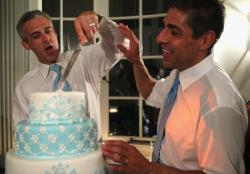The Associated Press Stylebook, the sturdy, fondly parodied newspaper reference guide, has lately found itself in the unwelcome position of wading into semantic political firefights. Last year, the editors decided to advise against the use of homophobia in stories; another muddle emerged over illegal immigrant. The outraged blog headline this week is some variation of “Associated Press: ‘Husband’ and ‘Wife’ Are for Heterosexual Couples Only.” Others have referred to a “ban” on using “husband” or “wife” to refer to for same-sex couples.
In truth, the AP didn’t ban anything, nor did it say “husband” and “wife” are reserved for opposite-sex couples. Instead, in a memo responding to queries, editors had this to say:
We were asked how to report about same-sex couples who call themselves “husband” and “wife.” Our view is that such terms may be used in AP stories with attribution. Generally AP uses couples or partners to describe people in civil unions or same-sex marriages.
Later, when the note leaked on Romenesko and a collective freakout began, they followed up with this:
We were asked how to report about same-sex couples who call themselves “husband” and “wife.” Our view is that such terms may be used in AP content if those involved have regularly used those terms (“Smith is survived by his husband, John Jones”) or in quotes attributed to them. Generally AP uses couples or partners to describe people in civil unions or same-sex marriages.
No ban, and really, no strong preference on the matter. Yet Gawker claimed the policy was a form of “separate but equal,” and AMERICAblog insisted it was a ban on using the words, arguing that it meant the “AP doesn’t think gay marriages are legit, and certainly not equal to straight marriages.” GLADD weighed in and suggested that the third sentence “implies a value judgement on the part of AP—that same-sex marriages ‘generally’ need vocabulary that differentiates them from opposite-sex marriages.”
The Associated Press does not have an opinion on gay marriage, to be clear, because that isn’t its role. This memo doesn’t imply one. The AP is a news organization, and the fact is that legal gay marriage remains an elusive thing, even in U.S. states that allow it, because the Defense of Marriage Act prevents full equality. Some states (and countries, for that matter) have civil unions, some have gay marriage, and some have granted no legal form of marriage to same-sex couples at all. This attempt by the AP to establish a standard usage is less a value judgement than an effort to provide a consistent guideline where none really exists. Instead, it grants authority on the matter to the couples, who really should get to decide.
Gay people, married and unmarried, argue over what to call each other in relationships, and pretty much everyone has an opinion. I am in a domestic partnership in a state that only recently approved gay marriage, but I still prefer “boyfriend.” Many others have different preferences. Do two gay men become “husband and husband” by default just because they can get “legally married,” whatever we take that to mean?
No. A stylebook is always a loose, evolving set of guidelines that publications can and do alter, and the Associated Press is no different. For some, legal marriage may seem to necessarily confer the words husband and wife whatever the sex of the people involved—but at this moment in time, that isn’t for the Associated Press to decide. As the editors rightly suggest, that’s up to the people in the marriage.
